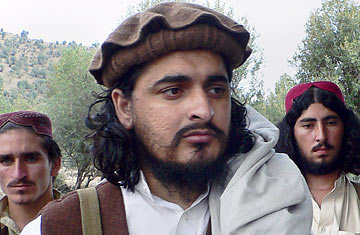
Pakistani Taliban chief Hakimullah Mehsud arrives to meet with media in Sararogha, South Waziristan, along the Afghanistan border
Is Hakimullah Mehsud — the ruthless leader of the Pakistani Taliban who has unleashed a wave of suicide bombings around the country in the past year — dead or alive? The mystery deepens. In mid-January, U.S. and Pakistani intelligence reported that Mehsud may have been hit by a U.S. missile strike in the sawtoothed ranges along Pakistan's border with Afghanistan, a claim that was at once disputed by the Taliban. Then on Tuesday, Pakistani TV channels, quoting an unnamed Taliban commander, reported that Mehsud had indeed been injured by the missile, and that he lapsed into a coma and died on Feb. 7 near Multan, a large town in Punjab province, where Mehsud's aides were hoping to find a doctor, both skilled and discreet, who was willing to treat Pakistan's most-wanted man. On Wednesday, the Pakistani government confirmed reports that Mehsud has died, and the Taliban has continued to deny it.
Some Taliban experts in Islamabad believe that doubts about Mehsud's death are greatly exaggerated. They point to the fact that the Taliban commander, whose eyes are rimmed with kohl and who wears shoulder-length locks, loves publicity and would pop up in a minute if he were still alive. Last October, Mehsud posed for visiting journalists like a B-movie action hero with a rocket-propelled grenade on his shoulder, and then again leering behind the wheel of a humvee that his men had looted from a NATO convoy trapped in the canyons of the Khyber Pass.
But there has been no sign of Mehsud since his appearance in October, only a continuing flurry of denials by spokesmen of the Pakistani Taliban — a slightly different breed from the Afghan jihadis — that their commander had died. On Tuesday, following the television broadcasts, a Taliban commander told the Pakistani daily The News that Mehsud had become too high profile, and was instructed to hide from the U.S. Predator drones that were raking the skies over the tribal lands in search of al-Qaeda and Taliban leaders, thereby escaping another strike. Meanwhile, the Pakistani army admitted to journalists that it had "no solid information" about Mehsud's death, other than persistent stories from tribal leaders.
U.S. forces intensified their drone flights over Pakistan's lawless border region after a video was released showing Mehsud posing with a Jordanian doctor, a double agent who on Dec. 30 blew himself up along with seven CIA agents and a Jordanian intelligence officer at a U.S. base near Khost in eastern Afghanistan. Since Jan. 1, say Pakistani military officials, the unmanned drones — the most feared weapon in the U.S. arsenal — have struck 15 times inside Pakistan, usually in remote mountain hamlets that Pakistani ground forces cannot reach.
Some Taliban experts say that if Mehsud is indeed dead, his organization won't announce it until a new leader for the Pakistani Taliban is chosen — and that could take a while. "Very likely, there is confusion in the ranks," Talat Masood, a retired general and political analyst, told TIME. "The Taliban will keep on denying Mehsud is dead until the battle for succession is over."
Agreeing on a successor to Mehsud, who has led the organization for less than a year, won't be easy, but a Taliban commander quoted in the news said it would probably be Waliur Rehman, a high-ranking fellow Mehsud tribesman from South Waziristan. But he may not be acceptable to other Taliban fighters scattered across the lawless borderlands. Although various regional commanders are united under the organization Tehrik-e-Taliban Pakistan, their reasons for becoming Taliban are varied. The ideology of replacing the pro-Western Islamabad government with an al-Qaeda-inspired Islamic caliphate is often a flag of convenience for other motives. Some joined the Taliban for revenge against Islamabad for past assaults against their tribes and for U.S. drone strikes. Others, especially along the Khyber Pass, are common bandits, while still others are sectarian, feuding with Shi'ite tribes. In general, the Pakistani Taliban are united in fighting against Islamabad, while the Afghan Taliban, with whom they are allied spiritually and often times logistically, are bent on killing American and NATO soldiers in Afghanistan.
Last year, more than a thousand Pakistanis were killed in 80 Taliban-orchestrated suicide attacks at volleyball games, pilgrimages, police academies, army bases and more. In response, Pakistan's army swept into the northern and southern ends of the tribal belt, particularly the Mehsud tribes' homeland in South Waziristan. With the Mehsuds flushed out of their stronghold, it is easier for the Drones to pick them off. "Because of improved cooperation between the American and Pakistani intelligence services," says analyst Masood, "the leadership of the Pakistani Taliban can't hide itself as effectively." And since the Mehsud tribesmen are now on the run, their influence over the other Pakistani Taliban is no longer so powerful. Likely successor Rehman may have a tougher time asserting himself as top commander.
That is a major victory for the Pakistanis and the Americans. The reign of terror of the previous Pakistani Taliban chief, Baitullah Mehsud, went on for two years before he was struck by a missile. Hakimullah Mehsud may have lasted only seven months. Whoever is next will have to keep glancing anxiously up at the sky, knowing that at any moment a missile could come streaking down. And that can only gladden his American and Pakistani hunters.
